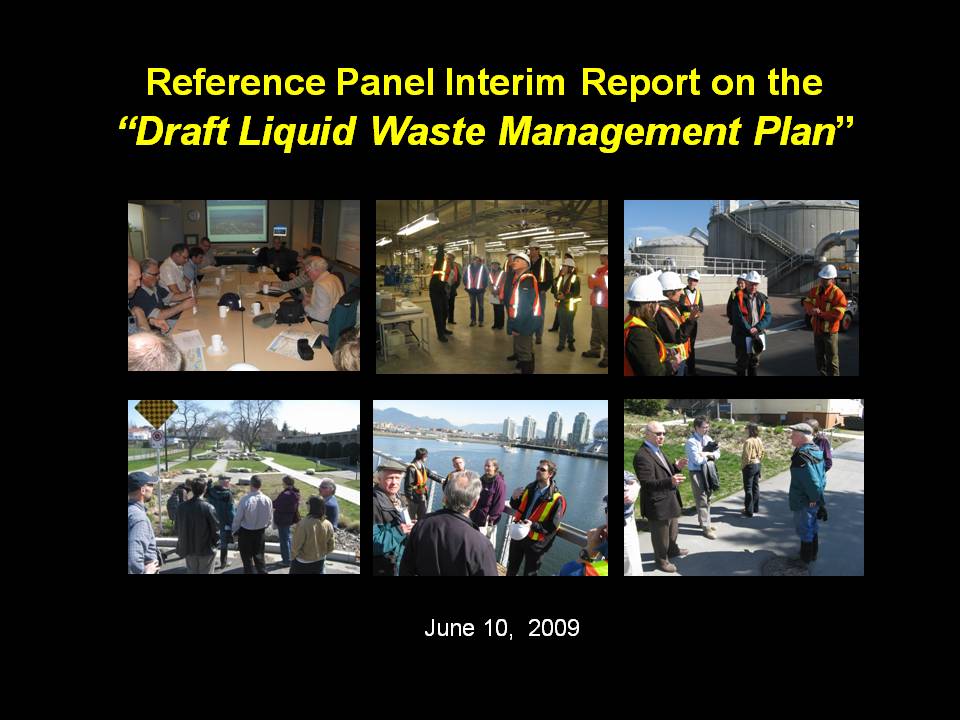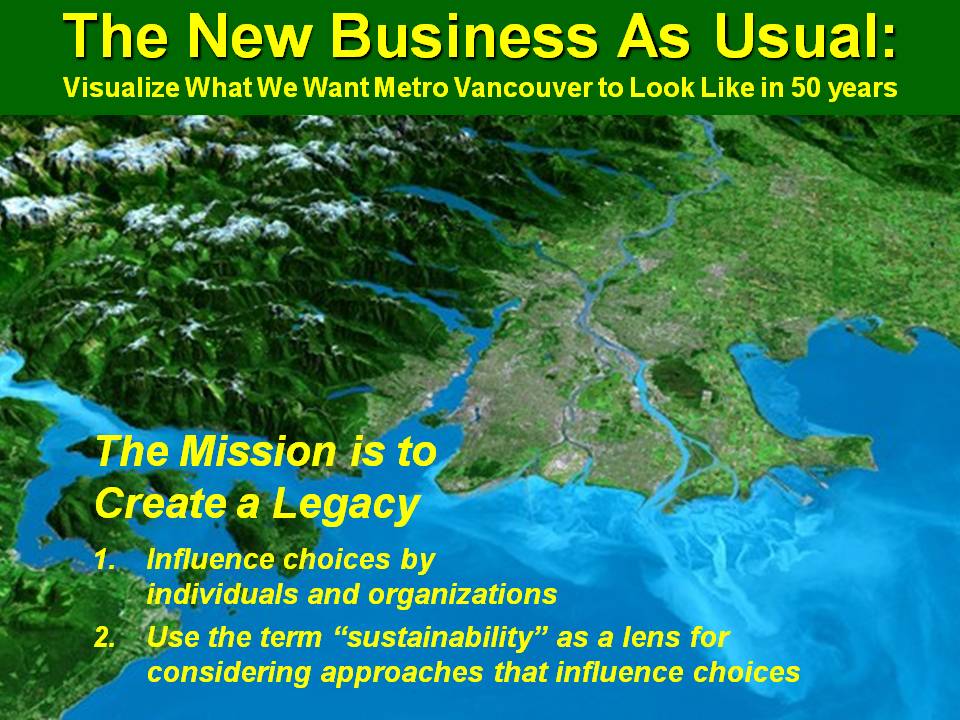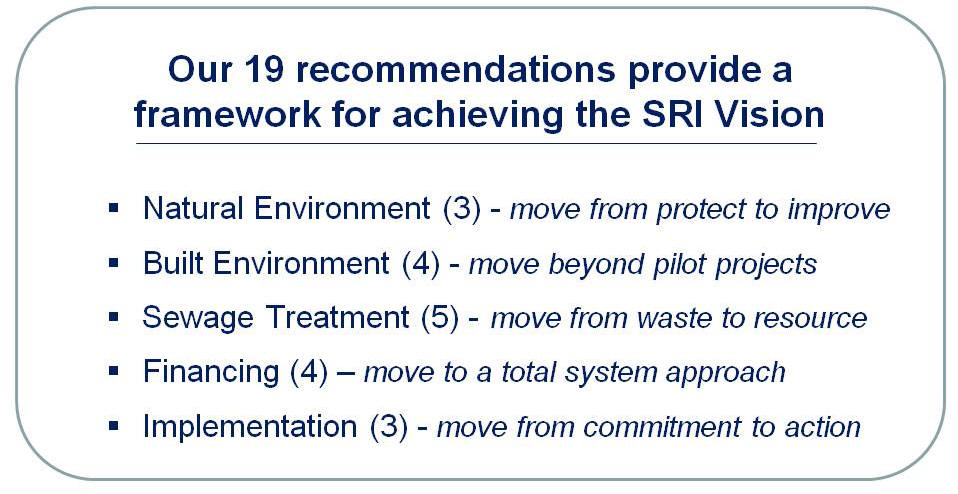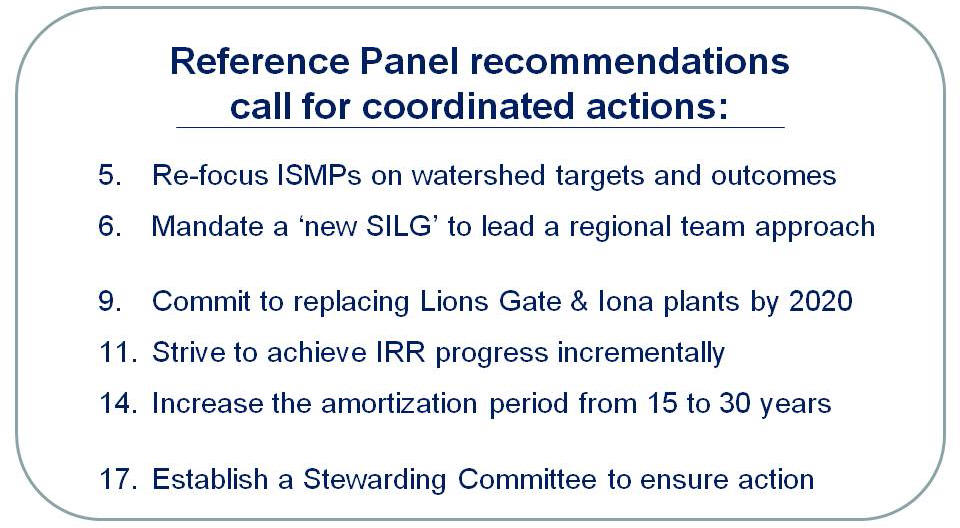Metro Vancouver Reference Panel presents Interim Report on region’s Liquid “Resource” Management Plan
Note to Reader:
To download a PDF version of the following web story, click on Metro Vancouver Reference Panel presents Interim Report on region’s Liquid “Resource” Management Plan
Advisory group proposes framework for more integration and action to achieve the Sustainable Region Vision
Metro Vancouver is in the final stages of updating the region’s Liquid Waste (Resource) Management Plan. The updated Plan establishes the approach, and identifies actions and priorities, for managing rainwater and sewage in the Metro Vancouver region. The current plan was approved in 2002.
Appointed by the Metro Vancouver Regional Board in April 2008 to provide independent review and recommendations on the Plan, the Liquid Waste Management Reference Panel presented their Interim Report to the Metro Vancouver Waste Management Committee on June 10, 2009.
Reference Panel Findings
To read the Reference Panel findings, click on Interim Report on A Liquid Resource Management Plan for Metro Vancouver. On the basis of their comprehensive review,  the Reference Panel have concluded that:
the Reference Panel have concluded that:
1. The Draft Plan is moving the region in the right direction to achieve the Sustainable Region Vision. However there is a need for stronger commitments in some areas in order to see the Plan realize its vision.
2. The Draft Plan can be characterized as a transition plan that, over time, will shift the region from the current practice of managing waste to one that values all its resources.
The Reference Panel is a community advisory group that brings expert knowledge and relevant experience in liquid waste/resource and rainwater management. The Reference Panel has a blend of technical, legal, scientific, academic, business, industry and community perspectives and values.
Region is Moving in the Right Direction: Focus on the Goal
 “When we met with the Waste Management Committee on May 13, we laid out a storyline for communicating our findings. The Interim Report elaborates on the storyline elements by presenting our recommendations. It is our synthesis of what we believe really matters,” stated Kim Stephens, Reference Panel Chair. “Our hope is that these over-arching recommendations will strengthen and improve the Plan; and that they will also help Metro Vancouver take the Plan from planning to action.”
“When we met with the Waste Management Committee on May 13, we laid out a storyline for communicating our findings. The Interim Report elaborates on the storyline elements by presenting our recommendations. It is our synthesis of what we believe really matters,” stated Kim Stephens, Reference Panel Chair. “Our hope is that these over-arching recommendations will strengthen and improve the Plan; and that they will also help Metro Vancouver take the Plan from planning to action.”
 “Our overall assessment is that the content in the Draft Plan is strong, but more integration of the vision in the actions is still needed so that the goals will in fact be achieved,” continued Christianne Wilhelmson, Co-Chair. “To help everyone focus on the ultimate goal – which is improve the natural environment – the Reference Panel has created a branding graphic for the final Plan. This shows the elements which must be integrated if we are to ensure that it will be a great Plan.”
“Our overall assessment is that the content in the Draft Plan is strong, but more integration of the vision in the actions is still needed so that the goals will in fact be achieved,” continued Christianne Wilhelmson, Co-Chair. “To help everyone focus on the ultimate goal – which is improve the natural environment – the Reference Panel has created a branding graphic for the final Plan. This shows the elements which must be integrated if we are to ensure that it will be a great Plan.”
Integration, Integration, Integration
“Each of these elements – the built environment, sewage treatment, financing and implementation – are represented in the Plan, however unless they are integrated to a 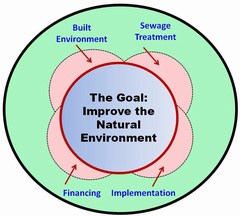 greater degree in the actions, the goal of protecting the environment will not be achieved as it has to be,” emphasized Christianne Wilhelmson when she explained each element of the graphic.
greater degree in the actions, the goal of protecting the environment will not be achieved as it has to be,” emphasized Christianne Wilhelmson when she explained each element of the graphic.
“The strategies and actions in the Plan will have an impact on Metro Vancouver’s sustainability for generations to come,” added Kim Stephens. “Hence, it is important to link those actions to a picture of a desired outcome that will inspire people to strive for constant improvement – this is what we want our region to look like, and this is how we will get there.”
19 Recommendations
The Reference Panel has developed a total of nineteen recommendations covering five theme areas. “Think of the Draft Plan as a blueprint….it has lots of details….but there is no artist’s rendering that creates a picture of the desired outcome,” Kim Stephens informed the Waste Management Committee. “To fill this gap, the Reference Panel has developed an action-oriented policy framework. Think of the 19 recommendations as guiding principles; they provide direction as to what needs to be done…to achieve the vision for managing sewage and rainwater as resources, not waste.”
“For each of the five theme areas, we have identified a tag-line to describe the shift from the old to a new way of doing business. Our hope is that Metro Vancouver will adopt our report as a guidance document.”
“The members of the Reference Panel believe it is essential that Metro Vancouver establish a Stewarding Committee to ensure that Plan implementation stays true to the Sustainable Region vision,” stated Christianne Wilhelmson. “There is a need for fresh, objective eyes bolstered by a strong political mandate to keep asking questions and assist with the paradigm-shift over time.”
Committee Response
 Marvin Hunt, Chair of the Waste Management Committee, proposed that several of the recommendations be used for illustrative purposes, thereby providing the committee with an appreciation of the ‘WHY’ behind the Reference Panel recommendations. This resulted in an interactive and workshop-type discussion as various Panel members elaborated on recommendations pertaining to wet weather flows, source controls and watershed planning.
Marvin Hunt, Chair of the Waste Management Committee, proposed that several of the recommendations be used for illustrative purposes, thereby providing the committee with an appreciation of the ‘WHY’ behind the Reference Panel recommendations. This resulted in an interactive and workshop-type discussion as various Panel members elaborated on recommendations pertaining to wet weather flows, source controls and watershed planning.
 In commenting on the value of the Interim Report as a guidance document, Mayor Pam Goldsmith-Jones of the District of West Vancouver emphasized what she saw as the need to “add a layer to the Interim Report that would connect the recommendations to provincial policy objectives.”
In commenting on the value of the Interim Report as a guidance document, Mayor Pam Goldsmith-Jones of the District of West Vancouver emphasized what she saw as the need to “add a layer to the Interim Report that would connect the recommendations to provincial policy objectives.”
“At the conclusion of the discussion, the Chair commended the Reference Panel for a job well done, and then the Waste Management Committee surprised us with a burst of applause,” said Kim Stephens. “We really appreciated and were touched by this recognition of our efforts. It may seem like a little thing, but the gesture meant more than words can say.”
Timeline for revising the Plan
Johnny Carline, Metro Vancouver Chief Administrative Officer, followed with a staff report. “First, it is becoming increasingly evident that more prominence must be given to the fact that it is Metro Vancouver’s intent to achieve an integrated  approach both to resource recovery and indeed to all the management plans. Secondly, through the consultation process several key issues related to wet weather management were identified where some municipal feedback is not consistent with provincial feedback and Reference Panel recommendations. These issues need to be addressed prior to finalizing the Plan.”
approach both to resource recovery and indeed to all the management plans. Secondly, through the consultation process several key issues related to wet weather management were identified where some municipal feedback is not consistent with provincial feedback and Reference Panel recommendations. These issues need to be addressed prior to finalizing the Plan.”
 At the conclusion of the ensuing discussion, City of White Rock Councillor Mary-Wade Anderson summarized by observing that: “The Interim Report is a very important document; having said that, 19 recommendations are too many to absorb by the July deadline, especially when twenty-two municipalities are involved. More time is needed to do this properly.”
At the conclusion of the ensuing discussion, City of White Rock Councillor Mary-Wade Anderson summarized by observing that: “The Interim Report is a very important document; having said that, 19 recommendations are too many to absorb by the July deadline, especially when twenty-two municipalities are involved. More time is needed to do this properly.”
The Waste Management Committee then directed Metro Vancouver staff to consult with the municipalities about the Reference Panel recommendations and bring forward a revised Plan in the Fall.
Wet Weather Flows
The Reference Panel was very clear in its call for action to resolve persistent and costly problems caused by groundwater and rainwater entering sanitary sewers from private property (Recommendation #4).
“Private service connections are the unmanaged part of the sewer collection system,” stated Christianne Wilhelmson. “They contribute a reported 40% of all wastewater collected, transported and treated in the regional system; and this is an important and significant source of regional system over overflows. The problem is known, but action is not forthcoming in plan after plan.”
Shaun Carroll and Susan Rutherford added their technical and legal perspectives on tools that would enable municipalities to implement timely and appropriate measures on private property. In particular, Susan pointed out that the necessary research has been done and referred the Waste Management Committee to a 2007 Metro Vancouver report titled Private Sewer Laterals: A Summary of Governance Issues and Strategies to Address Infiltration and Inflow. “It is a matter of having the political will to deal with the matter,” she concluded.
 Source Controls
Source Controls
The interactive discussion with the Waste Management Committee also encompassed the quality of flow entering sanitary sewers. Garry Cooper elaborated on financial incentives, enforcement resources and automated monitoring technologies that would ensure effective source control in the industrial-commercial-institutional sector (Recommendation #12).
“The total cost of allowing substances to become part of the sewage system – treatment, pipe maintenance and replacement, impacts of toxins in the environment – is far greater than investing in effective source control implementation. In other words, it will save the region more in the long term,” summarized Christianne Wilhelmson.
Re-focus Watershed Planning
The Reference Panel was also very clear in its call for action to re-focus Integrated RAINwater/Stormwater Management Plans on watershed targets and outcomes so that there are clear linkages with the land use planning and development approval process (Recommendation #5).
Protect Watershed Health
“ISMPs are needed to develop affordable and effective land use strategies that both green the urban landscape and improve watershed health; however, they must be effectively developed and there must be financial and legal tools in place to ensure their  implementation in the land development process,” explained Kim Stephens.
implementation in the land development process,” explained Kim Stephens.
“Currently, ‘glorified’ master drainage plans that do not integrate land use and drainage planning are resulting in unaffordable infrastructure budget items that become liabilities, without providing offsetting stream health benefits.”
 “Decisions we make on the built environment have a direct impact on the health of the natural environment,” added Christianne Wilhelmson. “The Reference Panel recommendations speak to the need to become more consciously aware of this interconnection in our planning, regulation and decision-making.”
“Decisions we make on the built environment have a direct impact on the health of the natural environment,” added Christianne Wilhelmson. “The Reference Panel recommendations speak to the need to become more consciously aware of this interconnection in our planning, regulation and decision-making.”
Previous Stories About Reference Panel
posted on the Green Infrastructure COI: Metro Vancouver appoints Reference Panel to provide input to Liquid Waste Management Plan
posted on the Green Infrastructure COI: Metro Vancouver Reference Panel calls for Liquid “Resource” Management Plan
posted on the Rainwater Management COI: Metro Vancouver Reference Panel raises questions about ISMP process and outcomes to date
posted on the Water-Centric Planning COI: Metro Vancouver Reference Panel shares water-centric vision with Regional Engineers Advisory Committee
posted on the Water-Centric Planning COI: Nutrient Recovery: Metro Vancouver Reference Panel looks into the future – Magic crystals point the way to a sustainable future
posted on the Water-Centric Planning COI: Metro Vancouver Board Aligns Regional Planning Vision with “Living Water Smart, BC’s Water Plan”
posted on the Convening for Action COI: Metro Vancouver Reference Panel presents Progress Report on region’s Liquid “Resource” Management Plan
posted on the Rainwater Management COI: Water-Centric Development at the University of British Columbia informs Metro Vancouver Reference Panel
posted on the Green Infrastructure COI: World class innovation at Southeast False Creek informs Metro Vancouver Reference Panel


